Related Research Articles
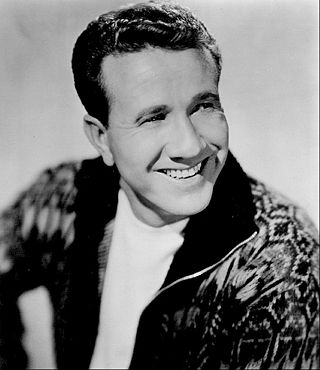
Martin David Robinson, known professionally as Marty Robbins, was an American singer, songwriter, multi-instrumentalist, and NASCAR racing driver. Robbins was one of the most popular and successful country and western singers for most of his nearly four-decade career, which spanned from the late 1940s to the early 1980s. He was also an early outlaw country pioneer.

John Marty Stuart is an American country and bluegrass music singer, songwriter, and musician. Active since 1968, Stuart initially toured with Lester Flatt, and then in Johnny Cash's road band before beginning work as a solo artist in the early 1980s. He is known for his combination of rockabilly, country rock, and bluegrass music influences, his frequent collaborations and cover songs, and his distinctive stage dress.

Connie Smith is an American country music singer and songwriter. Her contralto vocals have been described by music writers as significant and influential to the women of country music. A similarity has been noted between her vocal style and the stylings of country vocalist Patsy Cline. Other performers have cited Smith as influence on their own singing styles, which has been reflected in quotes and interviews over the years.
Everett "Cotton" Owens was a NASCAR driver. For five straight years (1957–61), Owens captured at least one Grand National Series win. Owens was known as the "King of the Modifieds" for his successes in modified stock car racing in the 1950s.
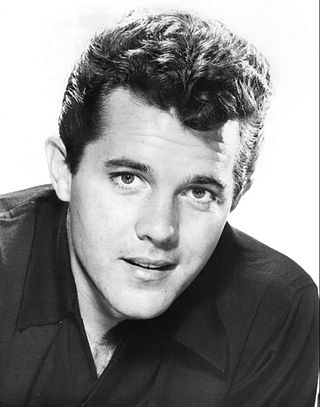
John Ashley was an American actor, producer and singer. He was best known for his work as an actor in films for American International Pictures, producing and acting in horror films shot in the Philippines, and for producing various television series, including The A-Team.
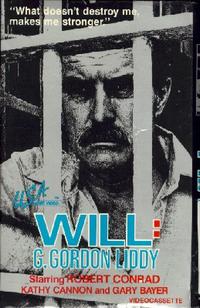
Will: G. Gordon Liddy is an American television film which first aired on NBC on January 10, 1982. The film depicts the rise and fall of Watergate co-conspirator G. Gordon Liddy. Liddy was portrayed by two actors: American actor Robert Conrad played Liddy as an adult and child actor Danny Lloyd portrayed him in his youth. Other figures associated with the Watergate scandal and portrayed in this film include Jeb Magruder and John Dean. The movie was directed by Robert Lieberman and was based on Liddy's 1980 autobiography.
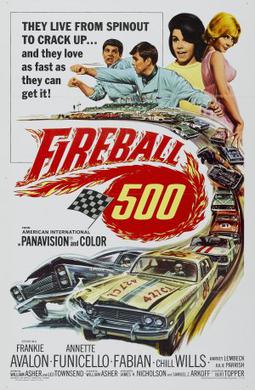
Fireball 500 is a 1966 stock car racing film, blended with the beach party film genre. A vehicle for stars Frankie Avalon, Annette Funicello, and Fabian, it was one of a string of similar racing films from the 1960s. Written by William Asher and Leo Townsend, and directed by William Asher, it tells the story of Dave Owens (Avalon), a stock car racer forced to run moonshine.

High School Caesar is a 1960 American film directed by O'Dale Ireland. Matt Stevens as the "guy with the power" at his high school but everyone despises him. He isn't, after all, known for his fairness and generosity. The tables are turned, however, when his fellow students resent his power and show him up at a drag race. Filmgroup released the film as a double feature with Date Bait.
Roy Hall, known as "Rapid Roy" and "Reckless Roy", was a pioneering American stock car racing driver, who achieved success in the early days of the sport driving cars owned by Raymond Parks and prepared by Red Vogt. Hall was also involved in the moonshine trade in north Georgia in the 1930s and 1940s and would compete in three events in the NASCAR Strictly Stock Series shortly following its formation.

Suicide Battalion is a 1958 World War II film directed by Edward L. Cahn and starring Mike Connors and John Ashley, who made the film while on leave from the United States Army. In 1968, it was remade for television by Larry Buchanan as Hell Raiders, which was the film's original working title.

The Woman Hunt is a 1972 film directed by Eddie Romero and starring John Ashley, Pat Woodell, and Sid Haig.

Dragstrip Girl is a 1957 film starring John Ashley in his first lead role. American International Pictures released the film as a double feature with Rock All Night and it proved an early success for the studio.
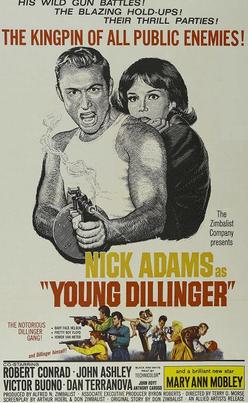
Young Dillinger is a 1965 gangster film directed by Terry O. Morse. It stars Nick Adams as the notorious criminal John Dillinger, and co-stars Robert Conrad, John Ashley and Mary Ann Mobley.

Motorcycle Gang is a 1957 film which is a semi-remake of Dragstrip Girl. It was released by American International Pictures as a double feature with Sorority Girl.

Hot Rod Gang is a 1958 drama film directed by Lew Landers and starring John Ashley. The working title was Hot Rod Rock with the film also released under the title Fury Unleashed. American International Pictures released the film as a double feature with High School Hellcats. The production includes performances by rock and roll musician Gene Vincent, and was the final theatrical feature directed by the incredibly prolific Landers, whose career dated to the mid-1930s.
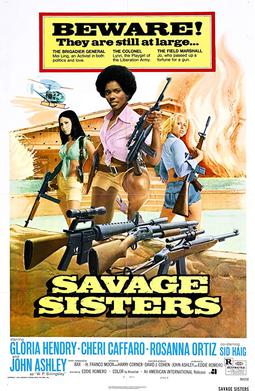
Savage Sisters is a 1974 women in prison film made in the Philippines and directed by Eddie Romero.

Smoke in the Wind is a 1975 American Western film directed by Andy Brennan and Joseph Kane. It marked Walter Brennan's final film role as he died over six months before the film's release.
Sudden Death is a 1977 action film directed by Eddie Romero, starring Robert Conrad, and costarring Thayer David, Larry Manetti and Nancy Conrad, Robert Conrad's real life daughter.

Coach of the Year is a 1980 American TV film about a paraplegic coach, starring Robert Conrad, Erin Gray, Red West and Daphne Reid. It aired on December 20, 1980 on NBC.

The Road to Nashville is a 1967 American musical film directed by Will Zens and starring Marty Robbins and Connie Smith.
References
- ↑ Lamont, John (1990). "The John Ashley Filmography". Trash Compactor (Volume 2 No. 5 ed.). p. 26.
- ↑ Martin, B. (Mar 14, 1967). "Burke, bixby given roles". Los Angeles Times. ProQuest 155683313.
- ↑ Lamont p 2
- ↑ Lamont p 4
- ↑ Vagg, Stephen (December 2019). "A Hell of a Life: The Nine Lives of John Ashley". Diabolique Magazine.[ permanent dead link ]